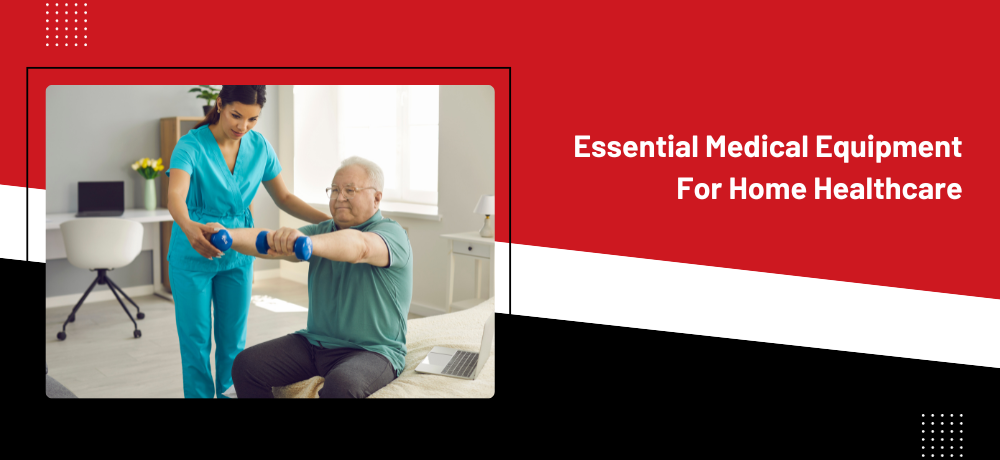
Essential Medical Equipment For Home Healthcare
- Carepaks Health Services
Home healthcare is a growing preference for individuals seeking personalized and comfortable care settings. Essential medical equipment plays a crucial role in facilitating effective home-based healthcare. Whether you are a caregiver, a patient, or someone interested in the field, understanding the key equipment is vital. In this guide, we'll explore the essential medical equipment for home healthcare.
1. Mobility Aids: Supporting Independence
Wheelchairs and Walkers
For individuals with mobility challenges, wheelchairs and walkers are indispensable. They enhance mobility, providing support for those who may have difficulty walking independently. Choosing the right type depends on individual needs and the home environment, ensuring safe and convenient movement.
Canes and Crutches
Canes and crutches are essential aids for individuals with temporary mobility issues. They provide stability and support, aiding in balance and reducing the risk of falls. Proper training on the use of these aids ensures their effectiveness.
Transfer Equipment
For patients who require assistance moving from one surface to another, transfer equipment such as transfer boards and mechanical lifts can make the process smoother and safer for both the patient and the caregiver.
2. Monitoring Devices: Ensuring Health and Safety
Blood Pressure Monitors
Monitoring vital signs is crucial for managing various health conditions. Home blood pressure monitors allow patients and caregivers to track blood pressure regularly, facilitating early detection of any abnormalities.
Pulse Oximeters
Pulse oximeters measure oxygen saturation levels in the blood. They are especially important for individuals with respiratory conditions, helping to monitor and manage oxygen levels in the comfort of their homes.
Glucose Monitors
For those managing diabetes, having a glucose monitor at home is essential. Regular monitoring of blood glucose levels aids in medication management and lifestyle adjustments.
3. Respiratory Equipment: Supporting Respiratory Health
Nebulizers
Patients with respiratory conditions often require nebulizers to administer medication in the form of a mist that is inhaled into the lungs. This equipment is vital for managing conditions like asthma or chronic obstructive pulmonary disease (COPD).
CPAP/BiPAP Machines
Individuals with sleep apnea benefit from Continuous Positive Airway Pressure (CPAP) or Bilevel Positive Airway Pressure (BiPAP) machines. These devices help maintain open airways during sleep, improving breathing and quality of sleep.
Oxygen Concentrators
For those requiring supplemental oxygen, oxygen concentrators are essential. They extract oxygen from the air, providing a continuous flow to patients who have difficulty breathing on their own.
4. Personal Care Aids: Ensuring Comfort and Dignity
Hospital Beds
Adjustable hospital beds offer comfort and facilitate caregiving. They allow patients to change positions easily, providing relief and preventing complications such as bedsores.
Commodes and Bedside Toilets
For patients with limited mobility, commodes and bedside toilets are invaluable. They provide a convenient and hygienic solution, enhancing independence in daily activities.
Patient Lifts and Slings
In situations where patients cannot move independently, patient lifts and slings assist caregivers in safely transferring individuals from one location to another, minimizing the risk of injury.
5. Safety and Accessibility: Creating a Secure Environment
Grab Bars and Handrails
Installing grab bars and handrails in key areas of the home, such as bathrooms and hallways, enhances safety and accessibility. They provide stability and support, reducing the risk of accidents.
Bed Rails
Bed rails are essential for preventing falls during sleep, especially for individuals who may experience restlessness or have difficulty getting in and out of bed independently.
Emergency Call Systems
In case of emergencies, having an emergency call system allows patients to call for help quickly. These systems are particularly crucial for individuals living alone or those with limited mobility.
Investing in essential medical equipment for home healthcare is a proactive step towards ensuring the well-being and comfort of patients. If you're considering home healthcare or are a caregiver seeking reliable equipment, then reach out to Carepaks Health Services. We recognize the significance of these tools in enhancing the quality of home-based care.
Get in touch with us today
To learn more about what we do, please click here. To contact us, please click here or call us at (309) 454-1000.
